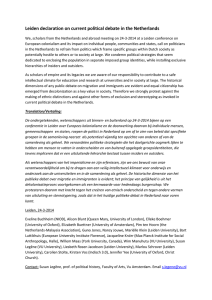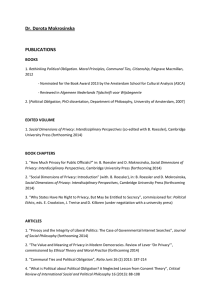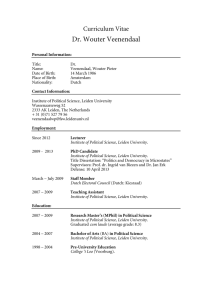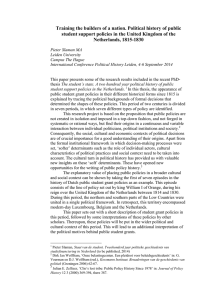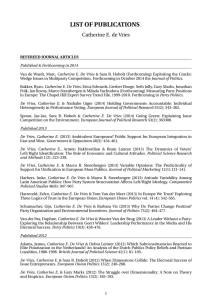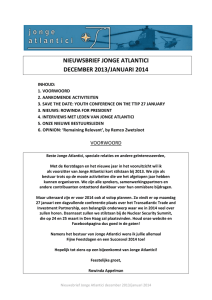Politicologenetmaal 2015_Call_for_Papers
advertisement
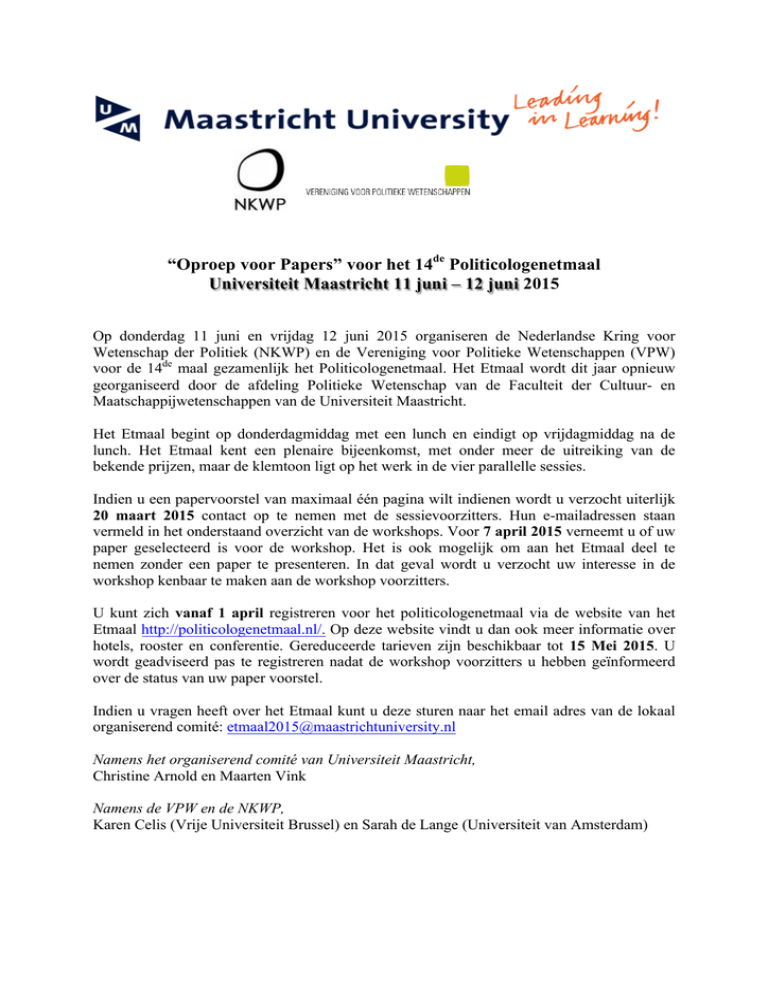
“Oproep voor Papers” voor het 14de Politicologenetmaal Universiteit Maastricht 11 juni – 12 juni 2015 Op donderdag 11 juni en vrijdag 12 juni 2015 organiseren de Nederlandse Kring voor Wetenschap der Politiek (NKWP) en de Vereniging voor Politieke Wetenschappen (VPW) voor de 14de maal gezamenlijk het Politicologenetmaal. Het Etmaal wordt dit jaar opnieuw georganiseerd door de afdeling Politieke Wetenschap van de Faculteit der Cultuur- en Maatschappijwetenschappen van de Universiteit Maastricht. Het Etmaal begint op donderdagmiddag met een lunch en eindigt op vrijdagmiddag na de lunch. Het Etmaal kent een plenaire bijeenkomst, met onder meer de uitreiking van de bekende prijzen, maar de klemtoon ligt op het werk in de vier parallelle sessies. Indien u een papervoorstel van maximaal één pagina wilt indienen wordt u verzocht uiterlijk 20 maart 2015 contact op te nemen met de sessievoorzitters. Hun e-mailadressen staan vermeld in het onderstaand overzicht van de workshops. Voor 7 april 2015 verneemt u of uw paper geselecteerd is voor de workshop. Het is ook mogelijk om aan het Etmaal deel te nemen zonder een paper te presenteren. In dat geval wordt u verzocht uw interesse in de workshop kenbaar te maken aan de workshop voorzitters. U kunt zich vanaf 1 april registreren voor het politicologenetmaal via de website van het Etmaal http://politicologenetmaal.nl/. Op deze website vindt u dan ook meer informatie over hotels, rooster en conferentie. Gereduceerde tarieven zijn beschikbaar tot 15 Mei 2015. U wordt geadviseerd pas te registreren nadat de workshop voorzitters u hebben geïnformeerd over de status van uw paper voorstel. Indien u vragen heeft over het Etmaal kunt u deze sturen naar het email adres van de lokaal organiserend comité: etmaal2015@maastrichtuniversity.nl Namens het organiserend comité van Universiteit Maastricht, Christine Arnold en Maarten Vink Namens de VPW en de NKWP, Karen Celis (Vrije Universiteit Brussel) en Sarah de Lange (Universiteit van Amsterdam) “Call for Papers” for the 14th Politicologenetmaal Maastricht University 11 June – 12 June 2015 On Thursday 11 June and Friday 12 June 2015, the 14th ‘Politicologenetmaal’ (‘24-hour Political Science Conference’) is jointly organized by the Political Science Associations of the Netherlands (NKWP) and Belgium (VPW) and the Department of Political Science at Maastricht University. The conference starts on Thursday (noon) with a lunch and ends on Friday (noon) after lunch. There will be four parallel sessions, two on Thursday afternoon and two on Friday morning. If you would like to submit a paper proposal to one of the workshops please submit a maximum of one page to the chairs of the workshop you are interested by the 20th of March 2015. The email addresses of the chairs of workshops are included below in the list of workshops. By the 7th of April 2015, the workshop chairs will inform everyone who has submitted a paper proposal. It is also possible to participate in the Etmaal without presenting a paper. One of the goals of the NKWP and the VPW is to bring together scholars and practitioners. If you are interested in one of the workshops, but do not wish to submit a paper proposal, please contact the workshop chairs and inform them about your interest in the workshop. Please make sure to register for the conference at the website http://politicologenetmaal.nl/, from 1 April onwards. On this website you may also find information on hotels, schedule and conference venue. ‘Early bird’ conference rates are available until 15 May 2015. Please register for the conference as soon as the workshop chairs have informed you about the status of your paper proposal. If you have any questions regarding the Etmaal, you can reach the members of the local organizing committee with the following email address: etmaal2015@maastrichtuniversity.nl On behalf of the organising committee at Maastricht University, Christine Arnold and Maarten Vink On behalf of the VPW and the NKWP, Karen Celis (Vrije Universiteit Brussel) and Sarah de Lange (Universiteit van Amsterdam) WORKSHOPS | ETMAAL 2015 | WORKSHOPS Nederlandstalige workshops 1. Nieuwe tijden, ander bestuur? 2. Beleidsevaluatie in woelige publieke wateren: pompen of verzuipen? Workshops in English 3. Personalization of Politics: How candidates and party leaders influence society 4. Determining the lines of conflict in politics 5. Lipset’s Legacy – The 55th Anniversary of Political Man 6. Same Old, Same Old? EU Foreign Policy Making after the Lisbon Treaty 7. The Quality of Elections 8. Political socialization and citizenship education of young people 9. Political Communication 10. The Contestation of Immigration, Ethnic Diversity and Citizenship 11. Elections: Dealing with Dealignment 12. Advances in Political Psychology 13. Political Theory 14. Developments in International Relations Workshop 1: “Nieuwe tijden, ander bestuur?” Workshop Chairs: Herwig Reynaert, Universiteit Ghent (herwig.reynaert@ugent.be) Peter Castenmiller (p.castenmiller@planet.nl) Waar staat het lokale bestuur in Nederland en Vlaanderen? In Nederland hebben de decentralisaties in het sociale domein ondertussen hun beslag gekregen. Er is veel en vaak gespeculeerd over de vraag of gemeenten dit wel aankunnen. Wat betekent deze uitbreiding van taken en verantwoordelijkheden voor de schaal van het bestuur en de positie van de raad? Ondertussen zullen er wat dit betreft eerste signalen zijn. In Vlaanderen is het lokale bestuur ook al jaren in transitie. Aan uitdagingen voor de lokale besturen zal het in de lokale driehoek politici – ambtenaren – burgers de komende tijd niet mankeren. Hebben de lokale besturen voldoende bestuurskracht? Zal de mogelijkheid tot vrijwillige fusies effectief tot fusies aanleiding geven? Hoe zal de integratie OCMWgemeente verlopen? Hoe zullen de verhoudingen tussen Vlaanderen, de provincies en de gemeenten zich verder ontwikkelen? In welke mate zullen de gemeenten en steden de Europese besluitvorming kunnen beïnvloeden? In welke mate zal Europa de besluitvorming op lokaal vlak verder beïnvloeden? Wat gebeurt er met de bestuurlijke drukte? Heel wat vragen die de komende tijd al dan niet een antwoord zullen krijgen. Lokaal goed besturen is één van de grote uitdagingen van het politiek bedrijf. Een goed lokaal bestuur is immers de hoeksteen van een democratische samenleving die Vlaanderen en Nederland moet zijn. Het is goed dat er elk jaar een platform is waar Nederlandse en Vlaamse politicologen een tussenbalans kunnen opmaken. Verandert er eigenlijk wel iets in het lokale bestuur, wat zijn dan die veranderingen en hoe moeten die veranderingen worden beoordeeld? Zijn de veranderingen wezenlijk en onomkeerbaar, of gaat het om oppervlakkige aanpassingen? De workshop op het Etmaal is de plek om daarover papers te presenteren en te bespreken. Peter Castenmiller (PBLQ Zenc) en Herwig Reynaert (Universiteit Gent) organiseren de ondertussen langstlopende workshop, over lokale politiek, tijdens het politicologenetmaal. De workshop is daarmee dé ontmoetingsplaats voor alle politicologen in Nederland en Vlaanderen die zich bezig houden met het lokale bestuur. Onze insteek impliceert dat allerlei bijdragen over het lokale bestuur meer dan welkom zijn. Het essentiële doel van onze weerkerende workshop is om elke politicoloog die zich bezighoudt met lokale besturen een platform en ontmoetingsplaats te bieden waar kennis, ervaringen en inzichten uitgewisseld kunnen worden. Ook dit jaar, in Maastricht, bieden wij weer graag de mogelijkheid om naast die uitwisseling van kennis en informatie ook de persoonlijke relaties te versterken. Deelnemers aan de workshop of belangstellenden worden uitgenodigd om contact op te nemen met de organisatoren Herwig Reynaert (herwig.reynaert@ugent.be) en Peter Castenmiller (p.castenmiller@planet.nl). Vanzelfsprekend zijn wij ook meer dan geïnteresseerd in papervoorstellen. Workshop 2 “Beleidsevaluatie in woelige publieke wateren: pompen of verzuipen?” Workshop chairs: Dries Verlet, Studiedienst van de Vlaamse Regering, Dries.Verlet@dar.vlaanderen.be Frank Bongers, Dialogic, bongers@dialogic.nl Carl Devos, Universiteit Gent, Carl.Devos@UGent.be De publieke sector staat voor grote uitdagingen. Het streven naar efficiëntiewinsten vertaalt zich in drastische besparingen op personeel en werking. In deze context zien we ook een andere overheid opduiken. We gaan naar een slankere, maar bovenal andere overheid. Maar tegelijkertijd kan dit ook een sterkere overheid zijn. Essentieel hierbij is de rol die men weglegt voor de overheid. Niettemin zien we dat binnen alle beleidssectoren er zich grondige besparingen hebben aangediend en verder zullen aandienen. Daarnaast zien we bij centrale –zogenaamd horizontale– overheidsdiensten dat men meer en meer streeft naar zogenaamde “Centres of Government”. Uit de analyse van de OESO (2014) leren we dat dergelijke centrale overheidsdiensten nieuwe taken en verantwoordelijkheden krijgen. Deze gaan van strategische planning tot instant beleidsadvies en van leidinggeven aan overheidsbrede beleidsinitiatieven tot het monitoren en evalueren van output/outcomes. Op die manier spreekt men ook de (beleids-)evaluatiecapaciteit binnen de overheid aan. Maar laat het nu net deze capaciteit zijn die ook onder druk komen te staan. Zo zien we zowel in Nederland als in Vlaanderen grondige besparingen bij actoren binnen en buiten de overheid die beleidsondersteunend en beleidsevaluerend onderzoek verrichten. Hierbij denken we aan de onzekere toekomst van de lokale rekenkamers in Nederland en de steunpunten voor beleidsondersteunend onderzoek in Vlaanderen. Al deze evoluties leiden tot een nieuwe positionering van de verschillende actoren binnen de publieke dienstverlening. Dit doet meteen ook tal van vragen rijzen omtrent bijvoorbeeld de rol die beleidsevaluatie krijgt in deze nieuwe overheidscontext. Nemen de administraties deze rol op zich of wordt dit steeds meer de rol van de politiek? En wat met de positionering van de rekenkamers? Krijgen de sociale partners en het bredere georganiseerde middenveld hier een nieuwe rol toebedeeld? En wat met de rol van academische actoren en de (private) onderzoeksinstellingen? Kortom, tal van vragen dienen zich aan wat betreft de plaats die beleidsevaluatie krijgt binnen de veranderende overheidscontext. Voer genoeg voor een etmaal waarin academici en/of mensen uit de praktijk elkaar kunnen vinden. We richten ons hiermee vooral op (praktijk)politicologen, bestuurskundigen en beleidswetenschappers in Nederland en Vlaanderen. Workshop 3: “Personalization of Politics: How candidates and party leaders influence society” Workshop Chairs: Loes Aaldering, University of Amsterdam (l.aaldering@uva.nl) Daphne van der Pas, University of Amsterdam (d.j.vanderpas@uva.nl). Discussants include Prof. Kees Aarts (University of Twente) and Prof. Wouter van der Brug (University of Amsterdam) Political leadership matters! For decades, scholars have examined political leaders and, although some find the effects of candidates on election outcomes to be non-existent or negligibly small (e.g. King, 2002), most studies show that political leadership matters for voters when they cast a ballot (e.g. Mughan, 2000; Bittner, 2011). The often-studied personalization hypothesis states that media pay increasing attention to politicians, at the expense of issues and parties (e.g. Dalton et al., 2000; Karvonen, 2010); that media coverage on politicians focuses more strongly on non-political personality characteristics and the private lives of politicians (e.g. King, 2002; Kriesi, 2012); and that leaders are increasingly important for citizens in their vote decision (e.g. McAllister, 2007; Schmitt and Ohr, 2000). Closely related is the process of presidentialization, which entails that even in multiparty systems there is an increased focus on party leaders, comparable with the focus on the president in presidential systems (e.g. Mughan, 2000; Poguntke and Webb, 2007). However, the empirical results on the importance of leaders are inconclusive and it is argued that the contradicting findings can be explained by the conditionality of leader effects (e.g. Kriesi, 2012; Barisione, 2009). After much debate about whether leaders matter greatly or not at all, research in the past years has shifted to the question of under which conditions candidates matter. This has opened up the field to a wide range of conditional explanations, on the contextual level with electoral system, party system or country characteristics, on the leadership level with the behavior and characteristics of candidates, and at the individual level of the voter. This panel invites papers investigating the connection between political leaders and society, including research on the development of leader effects over time, specific candidate characteristics, the psychology behind leader effects, the selection procedure of candidates, charismatic leadership, the conditionality of leader effects on voting behavior, the role of the media in purportedly enhancing the importance of leaders, the portrayal and behavior of candidates in the media, the uniqueness of right-wing populist party leaders and methodological refinements for studying personalization of politics. The panel welcomes papers employing experimental designs, survey studies or other relevant methods. Papers that explicitly aim to strengthen our understanding of the causality involved in leader effects are encouraged. In addition, we are also particularly interested in papers with a comparative design, for instance comparing party leaders within a parliamentary system, comparing multiple parliamentary systems, or comparing parliamentary democracies with presidential systems. Workshop 4: “Determining the lines of conflict in politics” Workshop Chairs: Mark Bovens Universiteit Utrecht (m.bovens@uu.nl) Simon Otjes, Groningen University (simon@simonotjes.nl)* Harmen van der Veer, Amsterdam University (H.A.A.vanderVeer@uva.nl) Pieter de Wilde, Wissenschaftszentrum Berlin für Sozialforschung (pieter.dewilde@wzb.eu) Anchrit Wille, Universiteit Leiden (a.c.wille@cdh.leidenuniv.nl) The 'conflict of conflicts' is a crucial conflict in politics (Schattschneider 1960), i.e. the conflict concerning which line(s) of conflict are activated. There is an infinite number of possible political conflicts that could separate or unite political actors. Which line of conflict dominates determines voting behaviour, political cooperation in legislatures and governments. In the end, it defines which actors are in the majority and which are in the minority. In that way the ability to determine the lines of conflict is often the ability to determine the outcomes of democratic decision-making. This workshop invites papers that analyze conflict lines and opposing groups in different arenas (electorates, parliaments or governments). Studies can examine the structures underlying opinions or the actual, manifest, behaviour of political actors. We invite studies that focus on ideological divisions between citizens and parties: do the traditional cleavages, left-right, religious-secular, identified by Lipset and Rokkan still hold traction in structuring democratic politics, or are new cleavages activated, such as the globalization or education cleavage? It seems apparent that change is happening. But to what extent the candidates for new cleavages constitute truly new cleavages or whether they are the transformation of an old cleavage, remains to be seen. We also invite studies that examine political divisions that divide political actors, such as those between the government and the opposition, between responsible and responsive parties or within supranational polities such as the European Union, opposing national interests, which divide political actors in legislatures or governments. Central questions in this workshop are: what lines of conflict structures behaviour and opinions of voters, parties and/or other political actors? What drives the emergence of new ideological cleavages or the transformation of old ones? To what extent and under which conditions do ideological divisions structure particular behaviour? And what are the implications of differing lines of conflict for different groups (e.g. voters and parties) for the quality of representation? If sufficient papers for this session are submitted a number of parallel sessions may be organized. * Corresponding co-chair: please send your proposals here Workshop 5: “Lipset’s Legacy – The 55th Anniversary of Political Man” Workshop Chairs: Peter Achterberg, Tilburg University (p.achterberg@tilburguniversity.edu) Willem de Koster, Erasmus University Rotterdam (dekoster@fsw.eur.nl) Tim Reeskens, Tilburg University (t.reeskens@tilburguniversity.edu) Jeroen van der Waal, Erasmus University Rotterdam (vanderwaal@fsw.eur.nl) In 1960, Seymour Martin Lipset published Political Man: The Social Bases of Politics. In this seminal monograph, Lipset studied in a meticulous manner the social factors that undergird politics, combining groundbreaking theoretical ideas with rich empirical data. To date, the influence of Lipset’s Political Man on political sociology cannot be overstated. Being cited over 7,500 times, Political Man is one of the most pivotal social-scientific studies, as many corners in the field of political science, sociology, and related disciplines reflect the intellectual legacy of Political Man to find inspiration for the scientific study of value orientations, social movements, political elites and political parties, and political systems. The aim of this session is to bring together scholars from the Low Countries and beyond who work in the tradition of Seymour Martin Lipset, found inspiration in Political Man, and want to contribute to the preservation of Lipset’s rich intellectual legacy. While we aim to analyze how Lipset’s work aids understanding of politics in the Low Countries, we are particularly open to studies with a comparative perspective. Keeping in mind the subtitle of Political Man – The Social Bases of Politics – the relation between society and politics should be present in all contributions. Examples include, yet are not limited to, the study of social cleavages and the political outcomes of social positions. In addition to political scientists, we warmly welcome students of sociology, economics, public administration, and related disciplines, and are open to qualitative as well as quantitative studies that build on Lipset’s legacy. Workshop 6: “Same Old, Same Old? EU Foreign Policy Making after the Lisbon Treaty” Workshop Chairs: Dr. Heidi Maurer, Maastricht University: (h.maurer@maastrichtuniversity.nl) Dr. Kolja Raube, KU Leuven: (kolja.raube@ggs.kuleuven.be) This workshop investigates wider trends in EU foreign policy-making and critically evaluates the current European Union (EU) foreign policy research agenda. EU foreign policy scholarship shows a tendency to re-invent conceptual discussions and present those as “new”, unprecedented, and often as insulated from IR debates. A close reading of the literature from the past 40 years shows, however, that many fundamental issues were already present decades ago. It scrutinizes if and how qualitatively and quantitatively new challenges and transformations have indeed emerged in EU foreign-policy making over the past decades. In order to grasp the complexity of the EU´s attempt to engage with the outside world, the panel deliberately brings together scholars covering different foreign policy aspects: trade, development policy, security policy, EU approach to specific regions or strategic partners. Five years after the Lisbon Treaty and the establishment of the European External Action Service also provides an additional trigger to compare the impact of those more recent changes on the various policy areas covered by EU foreign policy. The workshop aims at a mix of junior and more senior researchers. Workshop 7: “The Quality of Elections” Workshop Chairs Hans Schmeets – Universiteit Maastricht / CBS (h.schmeets@maastrichtuniversity.nl) Max Bader – Universiteit Leiden (m.bader@hum.leidenuniv.nl) There has been growing interest in the issue of election quality in recent years. Election quality can be seen as encompassing two distinct dimensions. First, electoral integrity refers to the whether there is open, genuine competition, and to the absence of both pre-election and election-day manipulation of the vote. Second, administrative quality refers to whether the electoral process is conducted in line with a certain set of widely agreed upon (international) standards. The issue of election quality is pertinent both to democracies and non-democracies. While there is generally little doubt about the integrity of the electoral process in liberal democracies, the administrative quality of elections in those countries often leaves much to be desired.1 In elections in non-democracies, by contrast, the lack of electoral integrity is a matter of concern. There are different ways of assessing the quality of elections. Election quality can be viewed in terms of the extent of compliance with domestic legislation and/or international standards for elections. Second, the perceptions of specific domestic groups or the population at large can be seen as indicative of the quality of an election. Third, a measure of election quality can be established through a survey of impartial experts. And finally, electoral returns can be studied quantitatively to check for patterns that diverge from what would be expected in a manipulation-free election (‘election forensics’). This session is interested in the issue of election quality with regard to both its dimensions (electoral integrity and administrative quality) and with regard to both democracies and nondemocracies. Questions that the session intends to address include, but are not limited to: 1) How can we measure election quality? How valid and reliable are existing measures of election integrity based on election observation reports, expert and citizen surveys, and fraud forensics? How can existing data be leveraged to enhance our understanding of election quality? 2) What explains variation in election integrity? What are the causal mechanisms explaining changes over time in election integrity and differences between countries? Are explanations different in democracies and non-democracies? And how crucial are elections for (measuring) democracy? 3) What is the role of (domestic and international) election observation in assessing, and improving the quality of elections? What is the role of domestic and international actors in promoting electoral reform? How can new voting technologies help to improve election quality? And to what extent varies the methodology of (inter)national organizations in assessing the quality of elections? 1 For instance, election observation missions conducted by the OSCE have criticized elections in the Netherlands on various aspects. See http://www.osce.org/odihr/97291 Workshop 8: “Political socialization and citizenship education of young people” Workshop Chairs Dorien Sampermans, KU Leuven (Dorien.Sampermans@soc.kuleuven.be)* Lies Maurissen, KU Leuven (lies.maurissen@soc.kuleuven.be) Ellen Claes, KU Leuven (ellen.claes@soc.kuleuven.be) In this session we want to look into the effects of new challenges for schools regarding the political socialization of adolescents. Schools can play a role in students’ social and political development (Claes, Hooghe & Marien 2012) and most policymakers in western democracies are convinced of the importance to educate young people to become more informed, competent and responsible citizens (Torney-Purta, Wilkenfeld & Barber, 2008; Westheimer & Kahne 2004). Schools of course do not operate in a vacuum. Hence societal challenges (e.g. globalization and multiculturalism) also ask for new approaches regarding civic education. Also for citizenship education researchers changing contexts create new needs and opportunities. Recently highlighted topics in the field are new forms of political participation (Manning & Edwards, 2014), the relation between online activities and political participation (Quintelier & Vissers, 2008), the effect of open classroom climate and teacher-pupil interaction on civic attitudes. But also more traditional questions are reconsidered, for example: is SES still a strong predictor regarding the intention of young people to participate politically? Has the interplay of civic education and ethnic differences changed? In short political socialization studies and citizenship education research are - and should be evolving. This session wants to explore new, existing and changing trends in civic and citizenship education studies in diverse contexts of learning among youth. References Claes, E., Hooghe M., & Marien S. (2012). A two-year panel study among Belgian late adolescents on the impact of school environment characteristics on political trust. International journal of public opinion research, 24(2), 208-224. Manning N., & Edwards K. (2014). Why has civic education failed to increase young people’s political participation? Sociological research online, 19(1), z.p. Torney-Purta, J., Wilkenfeld, B., & Barber, C. (2008). How adolescents in 27 countries understand, support and practice human rights. Journal of social issues, 64(4), 857-880. Quintelier, E., & Vissers, S. (2008). The effect of Internet use on political participation. Social science computer review, 26(4), 411-427. Westheimer, J., & Kahne, J. (2004). What kind of citizen? The politics of education for democracy. American educational research journal, 41(2), 237-269. * Corresponding co-chair: please send your proposals here Workshop 9: “Political Communication” Workshop Chairs Laura Jacobs, KU Leuven, Belgium (Laura.Jacobs@soc.kuleuven.be) Lotte Melenhorst, Leiden University, the Netherlands (l.d.melenhorst@fsw.leidenuniv.nl) Over the past decades political communication, the study at the intersection of politics and communication, has evolved into an important subfield in political science. Technological developments and new trends in the media landscape are taking place at a fast pace, making the relationship between media and politics a dynamic and challenging topic of interest. This workshop aims to bring together researchers from Belgium and the Netherlands who study the interaction between media and politics from various perspectives. Politics is all about perception, and this renders various media – as popular information sources in contemporary Western societies – an important socialization potential to shape these perceptions. The power of the media to influence a whole range of political attitudes and behaviors can thus be considered quite substantial. In this workshop, we therefore especially welcome papers that deal with this relationship between media and political attitudes and behaviors. Examples may be the studies of media and political participation, media and policy making or media and political attitudes, such as political trust, antiimmigrant votes, etc. However, as the relationship between media and politics is inherently interdependent, research that investigates the impact of politics on media, and studies specifically addressing the interactions between media and politics are very much appreciated as well. Because we encourage topical research, this workshop also welcomes studies concerning the 2014 elections in Belgium and the Netherlands. When one says ‘elections’, one says ‘campaigning’, as politicians need to present themselves to the electorate in order to gain visibility and subsequently get votes. The various elections provide an excellent opportunity to (comparatively) study the relationship between election campaigns and voting behavior, both at the regional, national and European level. Also research specifically addressing the role of social media as new forms of communication between political actors and citizens is highly appreciated. In this workshop, we invite papers that deal with political communication (widely defined). Potential topics include but are not limited to: new media, media effects, agenda-setting, framing, election campaigns, media and political attitudes, mediatization. Both methodical papers and theoretical contributions are welcome, as well as case studies and comparative approaches. We welcome quantitative, qualitative as well as mixed-methods studies and contributions from both political science and communication scholars. Also welcome are papers that apply original methodologies (e.g. experimental studies). The working language of the panel is English. Papers may be submitted either in Dutch or in English. Workshop 10: “The Contestation of Immigration, Ethnic Diversity and Citizenship” Workshop Chairs Christof Roos, Vrije Universiteit Brussel (christof.roos@vub.ac.be) Costica Dumbrava, Maastricht University (c.dumbrava@maastrichtuniversity.nl) In most European countries mainstream political parties and the general society seem to have accepted the fact that they have become immigration countries over the past four decades. Governments have sought to actively define and manage their immigrant population by imposing distinct entry and residence conditions for particular groups of migrants (refugees, family migrants, types of labour migrants) (Morris 2001, Mau et al. 2012. In many countries of destination integration policies targeted immigrants’ social wellbeing and their economic performance. A series of reforms of citizenship laws relaxed provisions on dual citizenship mainly in order to ensure the smooth integration of immigrants. European countries politically and legally adapt to ever more diverse and globalized European societies. However, immigration is not without contestation. New social movements are forming that oppose religious and ethnic diversity; populist political parties reinforce anti-immigrant attitudes. These phenomena prompt questions such as: To what extent can we observe a ‘new’ mobilization against immigration and immigrants’ rights? Are current phenomena different from the electoral success of radical right anti-immigrant parties in the 1990s and 2000s? What are the actors behind the new anti-immigrant mobilization? What vision of society do they promote? What are their alternatives to cultural and ethnic diversity? What are the political and legal responses of the EU and of national and local actors to the current wave of anti-immigrant mobilization? The organizers welcome contributions from senior and junior researchers who work on issues related to current contestations of immigration policy, ethnic diversity and citizenship policies. The panel is open to different perspectives and to various methodologies; e.g. comparative political science, sociology, political theory. Workshop 11: “Elections: Dealing with Dealignment” Workshop Chairs Yves Dejaeghere , University of Antwerp (yves.dejaeghere@uantwerpen.be) Tom Louwerse, Trinity College Dublin (Tom.Louwerse@tcd.ie) Martin Rosema ,University of Twente (m.rosema@utwente.nl) Elections are increasingly fought in settings where structural bonds between voters and parties are exceptions rather than rule. Voters consider multiple candidates or parties and abstention, resulting in increasing electoral volatility and late decision making. This situation is often contrasted to the era of frozen electoral cleavages in which voting choices could be predicted well in advance from people’s socio-economic or cultural background or their longterm party identification. This workshop explores how voters respond to the challenges resulting from dealignment. One question is how voters cope with the increased choices they face. While there is evidence in the literature that short-term factors such as policy preferences and candidate evaluations are more important in vote choice, researchers also suggest that elections are not ‘free-foralls’ in which every voter is available to every party. If not ideological, which heuristics do voters use to reduce the choice set before a final decision? Can we show that the way voters decide has markedly changed over the last fifty years? While formerly partisan or ideological voters could be ‘rationally ignorant’ as they would vote for the same party in consecutive elections, contemporary dealigned voters need to be more informed if they want to make a conscious decision. This has given a new thrust to investigate the political knowledge of voters and campaign learning effects. How do voters make sense of the party-issue space in multiparty settings? How is this affected by issue saliency or campaign learning? What is the role of ‘strategic’ voting behaviour? Voters are presented with new tools that might help them in making their electoral choices, such as voting advice applications, which provide individualised recommendations based on voters’ (policy) preferences. In addition, opinion polls are ubiquitous during election campaigns, as are polling average and election prediction websites, which may help voters to assess the strategic context of the election. Are these tools well designed to be effectively helping dealigned voters? Do they influence how voters think about elections and the act of voting itself? This workshop welcomes contributions relating to these types of questions about voters’ responses to dealignment. We welcome comparative analyses as well as country studies that offer contributions to understanding the broader theoretical questions. Both qualitative and quantitative empirical studies are welcome, as are papers that contribute to conceptual and theoretical development. Language: English, but papers may also be written in Dutch Workshop 12: “Advances in Political Psychology” Workshop chairs: Meta van der Linden, KU Leuven (meta.vanderlinden@soc.kuleuven.be) Dr. Michael F. Meffert, Universiteit Leiden (m.f.meffert@fsw.leidenuniv.nl) Dr. Thomas de Vroome, ERCOMER Universiteit Utrecht (t.m.devroome@uu.nl) Political psychology is a thriving field concerned with understanding the psychological underpinnings and consequences of political phenomena. It explores the formation, change, and consequences of public opinion, core values, political preferences, attitudes, identity, and conflict within a social system. Political psychology provides sharp insights into contemporary social issues such as the transformation of political grievances into collective action, the rising popularity of populist radical right parties and anti-immigrant sentiments, the encouragement of reconciliation after political and social conflicts, citizens’ evaluation of parties and other governmental institutions, and parents’ influence on the political development of their children. Our workshop seeks and encourages submissions on any topic in these areas, including prejudice, multiculturalism, extremism, intergroup relations, group identification, social change, collective action, political socialization, ideology, party and candidate preferences, leadership, social and political trust, media effects, political knowledge, and political emotions. Hence, this call broadly encompasses many of the central themes in political psychology research. We are particularly interested in contributions that introduce new and original theoretical and/or methodological approaches within the field of political psychology. The purpose of the workshop is both to stimulate discussion on emerging themes within the discipline and to provide authors with valuable feedback to prepare their manuscript for publication. The workshop discussions will be in English, but papers may be submitted in either Dutch or English. Workshop 13: “Political Theory” Workshop organizers: Marcel Wissenburg, Radboud University Nijmegen (m.wissenburg@fm.ru.nl) Kasper Ossenblok, Ghent University (kasper.ossenblok@ugent.be) The Politicologenetmaal has become a highly appreciated and popular meeting place for political theorists and legal, social and political philosophers in the Netherlands and Belgium. This panel aims to foster the continued exchange of ideas, research and results among the Low Countries' political thinkers. We opt for a broad programme, open to all traditions and schools in political thought, as well as to any research topic and theme relevant to the discipline. Topics fruitfully presented and discussed in the past include: ü Methods in and methodology of political theory (including the debates on morality vs political practice and ideal vs non-ideal theory) ü Democracy theory (deliberation, representation, radical democracy, religion & democracy, meritocracy, associative democracy) ü Theories of justice (in the abstract and applied, national and global) ü The history of political thought ü The analysis and viability of political ideologies (from classics like liberalism, marxism and communitarianism to 'modern' feminism, populism, ecologism) This year, we invite participants to address in their papers, if and where possible, the suggestions made in the recent debate between Roland Pierik, Patrick Overeem and Tim Heysse (Res Publica 56 [2014/4], pp. 529-542) on what would be the most urgent issues to top the agenda of political theory in the Low Countries – among others: context-sensitivity, focus on the politician rather than the citizen, and understanding rather than preaching. The discussions during the workshop will be in English. Papers are preferably written in that language as well. Workshop 14: “Developments in International Relations” (workshop targeted at young academics organized in cooperation with “ismus”, the study association for political science students in Nijmegen) Workshop Chairs: Andrej Zaslove, Radboud University (a.zaslove@fm.ru.nl) Bertjan Verbeek, Radboud University (b.verbeek@fm.ru.nl) Mark Vlek de Coningh, Radboud University, markvlekdeconingh@gmail.com* This workshop is targeted at an audience of young political science students. We intend to organize a set of 4 sessions each lasting 1.5 hours in which students can present papers while getting feedback by both peers and experienced academics. The overarching theme of ‘Developments in International Relations’ will be subdivided in four themes, based on the papers we will receive. The general theme relates to new developments in International Relations and the impact they have on the way we approach among others war, security, development and the state. Examples of sub-themes could be -­‐ -­‐ -­‐ -­‐ Conflict and Security in the 21st Century Civil Society in International Organisations Effects of a globalising economy Hegemony and world order Each session will hold 3-4 papers from both students and academics. In addition, each session will have a panel chair and a discussant. The workshop will provide young academics the possibility to present their work while experiencing what an academic career means. The students co-organizing this workshop have previous experience organizing political science related activities. They were part of the organizing committee of the four-day 2014 IAPPS Autumn Convention, a student-led and organized congress with over 200 visitors from over 40 countries, with lectures, panels, workshops. Bachelor, Master and PhD students from universities in Belgium, the Netherlands and elsewhere are invited to submit their paper proposal to the workshop organisers. * Corresponding co-chair: please send your proposals here
